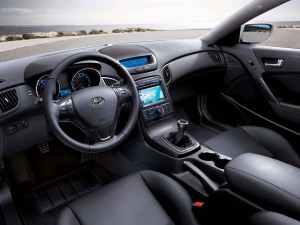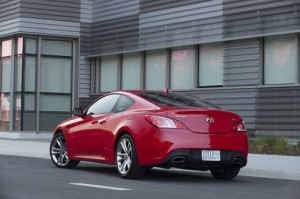Hyundai’s Genesis R-Spec 3.8 Coupe Needs More Track Time
Hyundai’s Genesis R-Spec is a de-contented, performance version of its personal coupe. You might expect R-Spec means “race-spec” but instead Hyundai spokespeople say it’s a general moniker similar to that used by Japanese manufacturers for track-focused versions of various production models. Whatever the specific meaning, Hyundai is clearly hoping the term conjures visions of track-day heroics and thus credibility with the enthusiast crowd.
So it’s in this context that I approached the 2011 Genesis R-Spec 3.8. The bottom line is that while I applaud its “green flag” spirit, the Genesis R-Spec needs more on-track work to be an apex-clipping barnstormer. As things stand, I’d wave the “caution flag”.
The Genesis R-Spec debuted with Hyundai’s 210 horsepower 2.0 liter turbocharged four cylinder. For 2011, the R-Spec can be had with an optional 3.8 liter V6 which delivers 306 hp and 266 lb-ft. of torque on regular gas. So equipped, it scoots to 60 mph in about six seconds.
The coupe shares its chassis with the Genesis sedan which is highly rigid but also has implications for the R-Spec’s handling. In keeping with its potential mission and image the R-Spec does without some non-essential convenience equipment such as automatic headlights, cruise control and some chrome/metalgrain interior accents. The deletions and attention to detail keep the curb weight down to a reasonable 3389 pounds.
The powerplant and stiff chassis are a good start. However by virtue of sharing its platform, R-Spec gives up some nimbleness. Its 111 inch wheelbase exceeds that of competitors like the Ford Mustang (107.1), Mazda RX-8 (106.4) and Nissan 370Z (100.4). Each of these has a dedicated platform and each turns-in with greater predictability and eagerness than the R-Spec. They do so in part thanks to better steering calibration. The R-Spec’s hydraulic rack-and-pinion unit is not at all progressive. Steering boost feels the same in a parking lot as apexing a corner with the throttle on. The ratio is quick but on turn-in you get too much boost, making steering twitchy.
Of course, the steering hinges on the MacPherson strut dual-link front and five-link independent rear suspension which gets stiffer front and rear spring rates and unique shock valving versus the stock Genesis coupe. Stiff it is. The coupe rolls very little but mid-corner bumps upset the rear, particularly with the power on. The suspension lacks harmony and on the street, the more compliant stock Genesis coupe setup is more comfortable and potentially quicker – possibly on track as well. Four-piston Brembo calipers clamp 13.4-inch ventilated front and 13-inch rear rotors, providing consistent stopping power. A long pedal on my frequently-tracked test car made it hard fully to vet their effectiveness.
The R-Spec’s six speed manual gearbox has room for improvement. The ratios are close and shift throws are short and positive. However it’s too easy to slot into third gear when you want first. Worse, reverse is positioned to the upper left, past first gear. On the 3 to 2 downshift one can actually move the shift lever left past 2nd beneath reverse and miss the gear. The clutch is the stiffest I’ve felt outside a real race car in some time and engagement is nearly an on-off proposition. Combine that with a very low take-up point and successfully blipping the throttle on downshifts is difficult. Clutch engagement is so quick, you invariably get too many revs. That matters less than the pedal positions which are not heel-toe friendly. On track, it adds up to a problematic transmission that demands too much driver attention.
The Genesis looks good from some angles and not from others. The small front grille makes the headlights seem very far apart. The profile is very Infiniti G37-esque but the dipping line of the rear quarter windows is distracting. Nineteen inch wheels dress the car nicely.
The front buckets are well bolstered but hard and uncomfortable after 30 minutes. The driving position is good and interior surfaces are adequate. Clear instrumentation fails to include oil pressure or oil temperature gauges, useful in a track machine. The lone traction control button is a refreshing bit of austerity. Rear seats are for children only but fold down completely and pass through to the trunk, making snowboard or short surfboard carriage a pleasant possibility.
As a personal luxury coupe, Hyundai has a price-savvy contender in the Genesis. Particularly in 2.0T trim, the R-Spec is tune-able. However, with either engine, it is an unfinished package. If you’re serious about hot-lapping, autocrossing, time-attack or more, there are better platforms at this price. The R-Spec needs more track time.
The Specs
Price as tested: $26,940
Engine: 306 hp 3.8 liter V6
Curb weight: 3389 pounds
Fuel Economy: 17 city/26 highway



Leave a Reply